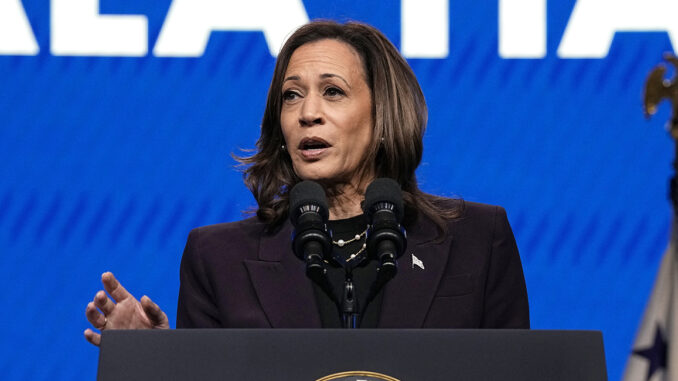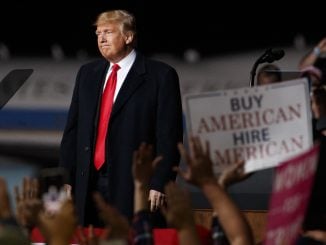
With inflation and high grocery prices still frustrating many voters, Vice President Kamala Harris proposed a ban on “price gouging” by food suppliers and grocery stores as part of a broader agenda to lower the cost of housing, medicine and food.
It’s an attempt to tackle Harris’s apparent vulnerability head-on: Under the Biden-Harris administration, grocery prices have shot up 21%, part of an inflation surge that has raised overall costs by about 19% and soured many Americans on the economy, even as unemployment fell to historic lows.
“We all know that prices went up during the pandemic when the supply chains shut down and failed,” Harris said Friday in Raleigh. “But our supply chains have improved, and prices are still too high.”
So what is price gouging? Economists would disagree on a strict definition, but gouging generally refers to spikes in prices that typically follow a disruption in supply, such as after a hurricane or other natural disaster. Consumer advocates charge that gouging occurs when retailers sharply increase prices, particularly for necessities, under such circumstances.
Several states have already restricted price gouging, but no federal-level ban exists.
Federal restrictions exist on related but different practices, such as price-fixing laws that bar companies from agreeing not to compete against each other and set higher prices.
Most economists would say Harris’ plan would not lower grocery prices, though it could impact future crises. For one thing, how much price gouging is happening right now needs to be clarified. Grocery prices are still painfully high compared to four years ago, but they increased just 1.1% in July compared with a year earlier, according to the most recent inflation report. That is in line with prepandemic increases.
President Joe Biden said inflation was defeated after last Wednesday’s report showed it fell to 2.9% in July, the smallest increase in three years. “There’s some dissonance between claiming victory on the inflation front in one breath and then arguing that there’s all this price gouging happening that is leading consumers to face really high prices in another breath,” said Michael Strain, an economist at the American Enterprise Institute. Sustained price declines typically only happen in steep, protracted recessions. Instead, economists generally argue that the better approach is for wages to keep rising enough so that Americans can handle the higher costs.
Still, inflation remains a highly salient political issue, and plenty of voters blame grocery stores, fast food chains, and food and packaged goods makers for the surge of inflation in the past three years. Corporate profits soared in 2021 and 2022.
“It could be that they’re looking at opinion polls that show that the No. 1 concern facing voters is inflation and that many voters blame corporations for inflation,” Strain said.
At the same time, even if prices aren’t going up as much, as Harris noted, they remain high, even as supply chain kinks have been resolved.
Elizabeth Pancotti, a policy analyst at Roosevelt Forward, a progressive advocacy group, points to the wood pulp used in diapers. Although wood pulp prices have fallen by half from its post-pandemic peak, diaper prices haven’t. “So that just increases the (profit) margins for both the manufacturers and the retailers,” she said.
Most economists would say price gouging hasn’t caused inflation, that it was a more straightforward case of supply and demand. When the pandemic hit, meat processing plants were occasionally closed after COVID-19 outbreaks, among other disruptions to supply. At the same time, several rounds of stimulus checks fattened Americans’ bank accounts, and after hunkering down during the early phase of the pandemic, so-called “revenge spending” took over. The combination of more robust demand and reduced supply was a recipe for rising prices. “What a lot of corporations did was exploit consumers’ willingness” to accept the disruptions from the pandemic, Pancotti said.
Still, some economists have argued that ample food and consumer goods companies took advantage of pandemic-era disruptions. Consumers saw empty store shelves and heard numerous stories about disrupted supply chains, and at least temporarily felt they had little choice but to accept the higher prices. Economist Isabella Weber at the University of Massachusetts, Amherst, called it “seller’s inflation.” Others referred to it as “greedflation.” Other economists say Harris’ proposal would have a similar impact. “It’s a heavy-handed socialist policy that I don’t think any economist would support,” said Kevin Hassett, a former top economic adviser in the Trump White House.


